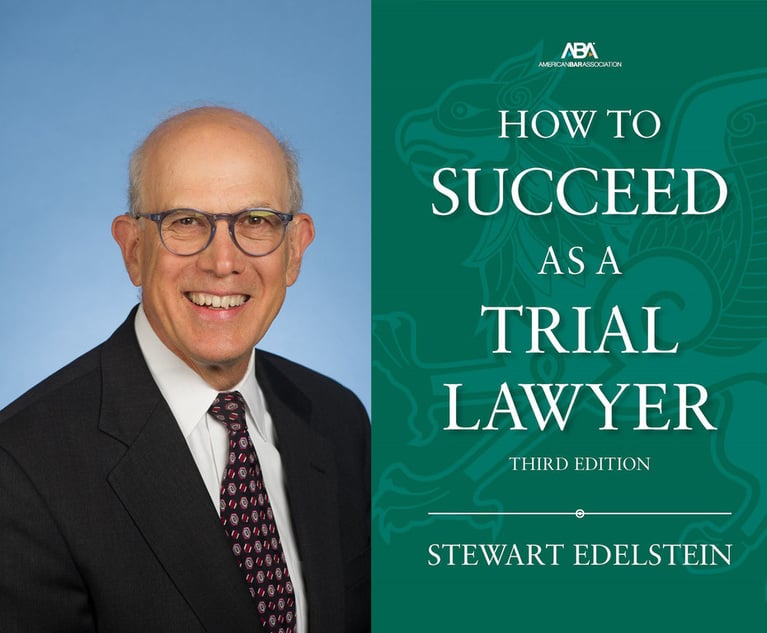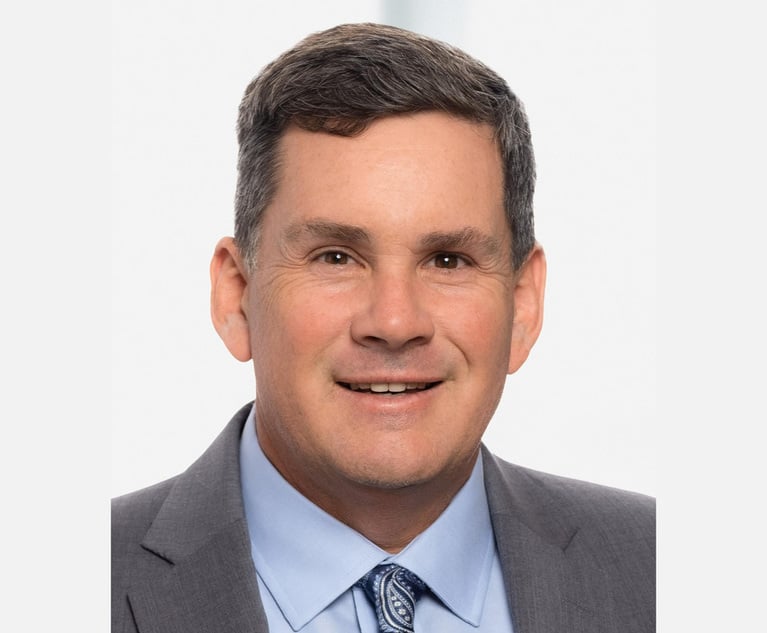 Rear Adm. Philip J. Greene, commander, Combined Joint Task Force-Horn of Africa, Marie-Pierre Lloyd, minister for Health and Social Development, and U.S. Ambassador to Seychelles Cesar B. Cabrera pose for a photo during a ceremonial ribbon cutting at the Grand Anse Medical Clinic. U.S. Air Force photo: Maj. Karen A Davis
Rear Adm. Philip J. Greene, commander, Combined Joint Task Force-Horn of Africa, Marie-Pierre Lloyd, minister for Health and Social Development, and U.S. Ambassador to Seychelles Cesar B. Cabrera pose for a photo during a ceremonial ribbon cutting at the Grand Anse Medical Clinic. U.S. Air Force photo: Maj. Karen A DavisKasowitz Benson Beats Ex-Client in Legal Malpractice Suit
The New York firm beat back a counterclaim for legal malpractice and won an order requiring former client Cesar Cabrera and his companies to pay more than $200,000 in unpaid bills and interest.
September 19, 2019 at 01:17 PM
3 minute read
The original version of this story was published on The American Lawyer
Kasowitz Benson Torres has prevailed in a suit brought by a Puerto Rican real estate developer client who claimed the firm took too long to sue his former lawyers at Meister Seelig & Fein for legal malpractice.
Kasowitz sued Cesar Cabrera last year for $191,000 in unpaid bills, and Cabrera countersued for legal malpractice, arguing Kasowitz missed an opportunity to sue attorney Stephen Meister for having bungled Cabrera's original claim against another developer. While a suit against Meister was eventually filed, U.S. District Judge P. Kevin Castel of the Southern District of New York threw it out it in May 2018.
In a decision filed Tuesday, Manhattan Supreme Court Justice O. Peter Sherwood found in favor of Kasowitz on both sets of claims. Even assuming Kasowitz had been retained to look into possibly suing Meister, the state judge wrote, Castel's decision was already binding on the issue of malpractice.
"Defendants cannot claim that Kasowitz caused them 'to lose valuable remedies against Meister' because the court in the Meister action found that 'plaintiffs did not exercise minimal diligence to identify their injury and its source,'" Sherwood wrote.
In an underlying dispute, Cabrera, a former U.S. ambassador to Mauritius and the Seychelles, and his companies Barza Development Corp. and Zumon Corp. accused Caribbean Property Group of reneging on its promise to buy or jointly develop a tract Cabrera and his companies owned in the town of Barceloneta.
He hired Meister in 2013 to deal with CPG, but Cabrera said the lawyer failed to act, leading him to hire the Kasowitz firm in 2015. After his federal lawsuit against Meister for legal malpractice failed, Cabrera hired the firm Storch Amini to represent him in his dispute with Kasowitz, claiming malpractice against the New York firm for its conduct in the prior malpractice case against Meister.
|Fee Dispute
With Cabrera's malpractice counterclaim dismissed against Kasowitz, Sherwood wrote in Tuesday's decision, there were no factual issues standing in the way of Kasowitz prevailing on its breach-of-contract claim for nonpayment of fees against Cabrera and his companies.
The judge refused to grant summary judgment on a similar account-stated claim Kasowitz brought, however, noting that Cabrera vowed that he objected to the bills and the firm didn't give Cabrera the monthly invoices it had agreed to issue. In one instance, after Kasowitz withdrew from the Meister case, the firm invoiced him for more than a year of previously unbilled legal work, according to Sherwood's opinion.
Because Kasowitz prevailed on its breach-of-contract claim, judgment was still issued in the firm's favor for legal fees. With the 9% annual interest the judge ordered, the sum Cabrera and his companies owe Kasowitz is nearly $240,000.
Steven Storch, a lawyer for Cabrera and co-founding principal of Storch Amini, said, "We respectfully disagree with the decision and we're evaluating legal options, including an appeal."
Meanwhile, Joshua Siegel, a Kasowitz partner who represented his firm, said in a statement: "We are pleased that the court confirmed that the allegations against the firm were unfounded."
This content has been archived. It is available through our partners, LexisNexis® and Bloomberg Law.
To view this content, please continue to their sites.
Not a Lexis Subscriber?
Subscribe Now
Not a Bloomberg Law Subscriber?
Subscribe Now
NOT FOR REPRINT
© 2024 ALM Global, LLC, All Rights Reserved. Request academic re-use from www.copyright.com. All other uses, submit a request to [email protected]. For more information visit Asset & Logo Licensing.
You Might Like
View All
Why the Founders of IP Boutique Fisch Sigler Are Stepping Away From the Law and Starting an AI Venture

‘How to Succeed as a Trial Lawyer’: Talking Shop With Author and Veteran Litigator Stewart Edelstein

Litigation Leaders: Labaton’s Eric Belfi on Running Case Investigation, Analysis and Evaluation In-House
Trending Stories
Who Got The Work
Michael G. Bongiorno, Andrew Scott Dulberg and Elizabeth E. Driscoll from Wilmer Cutler Pickering Hale and Dorr have stepped in to represent Symbotic Inc., an A.I.-enabled technology platform that focuses on increasing supply chain efficiency, and other defendants in a pending shareholder derivative lawsuit. The case, filed Oct. 2 in Massachusetts District Court by the Brown Law Firm on behalf of Stephen Austen, accuses certain officers and directors of misleading investors in regard to Symbotic's potential for margin growth by failing to disclose that the company was not equipped to timely deploy its systems or manage expenses through project delays. The case, assigned to U.S. District Judge Nathaniel M. Gorton, is 1:24-cv-12522, Austen v. Cohen et al.
Who Got The Work
Edmund Polubinski and Marie Killmond of Davis Polk & Wardwell have entered appearances for data platform software development company MongoDB and other defendants in a pending shareholder derivative lawsuit. The action, filed Oct. 7 in New York Southern District Court by the Brown Law Firm, accuses the company's directors and/or officers of falsely expressing confidence in the company’s restructuring of its sales incentive plan and downplaying the severity of decreases in its upfront commitments. The case is 1:24-cv-07594, Roy v. Ittycheria et al.
Who Got The Work
Amy O. Bruchs and Kurt F. Ellison of Michael Best & Friedrich have entered appearances for Epic Systems Corp. in a pending employment discrimination lawsuit. The suit was filed Sept. 7 in Wisconsin Western District Court by Levine Eisberner LLC and Siri & Glimstad on behalf of a project manager who claims that he was wrongfully terminated after applying for a religious exemption to the defendant's COVID-19 vaccine mandate. The case, assigned to U.S. Magistrate Judge Anita Marie Boor, is 3:24-cv-00630, Secker, Nathan v. Epic Systems Corporation.
Who Got The Work
David X. Sullivan, Thomas J. Finn and Gregory A. Hall from McCarter & English have entered appearances for Sunrun Installation Services in a pending civil rights lawsuit. The complaint was filed Sept. 4 in Connecticut District Court by attorney Robert M. Berke on behalf of former employee George Edward Steins, who was arrested and charged with employing an unregistered home improvement salesperson. The complaint alleges that had Sunrun informed the Connecticut Department of Consumer Protection that the plaintiff's employment had ended in 2017 and that he no longer held Sunrun's home improvement contractor license, he would not have been hit with charges, which were dismissed in May 2024. The case, assigned to U.S. District Judge Jeffrey A. Meyer, is 3:24-cv-01423, Steins v. Sunrun, Inc. et al.
Who Got The Work
Greenberg Traurig shareholder Joshua L. Raskin has entered an appearance for boohoo.com UK Ltd. in a pending patent infringement lawsuit. The suit, filed Sept. 3 in Texas Eastern District Court by Rozier Hardt McDonough on behalf of Alto Dynamics, asserts five patents related to an online shopping platform. The case, assigned to U.S. District Judge Rodney Gilstrap, is 2:24-cv-00719, Alto Dynamics, LLC v. boohoo.com UK Limited.
Featured Firms
Law Offices of Gary Martin Hays & Associates, P.C.
(470) 294-1674
Law Offices of Mark E. Salomone
(857) 444-6468
Smith & Hassler
(713) 739-1250







